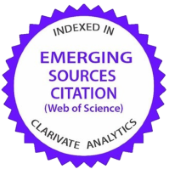Climate Change Mitigation Performance in the EU Tourism Destination Sector
DOI:
https://doi.org/10.29036/jots.v15i28.758Abstract
Climate change mitigation in the tourism sector is expanding research areas due to the importance of this sector and its rapid expansion. Aviation's contribution was found to be the most important source of GHG emissions from tourism. Also, the hospitality sector contributes a lot to GHG emissions in tourism destinations. Hospitality, constituting an essential component of the tourism industry, is a sector that has a high potential to reduce GHG and use of energy and water resources. Therefore, it is important to monitor the climate change mitigation performance of tourism destinations to achieve decarbonization of the tourism sector. The main objectives of this paper are to develop indicators of climate change mitigation performance of tourism destinations based on GHG indicators for the transport and hospitality sectors and apply this framework to assessment and ranking based on climate change mitigation performance of 4 main EU geographical regions as tourism destinations: Central, Northern, Southern, and Western Europe. This paper's main methodological approach is comparing and ranking different geographical regions in the European Union by assessing their climate change mitigation performance as tourist destinations. The study's main results showed that Finland, representing North Europe, is the best-performing country in climate change mitigation in tourism destinations. The second-best-performing geographical region is Western Europe. The worst-performing EU region based on climate change mitigation in tourism destinations was Central Europe. The South Europe region was found to be in a slightly better position than Central Europe but worse in comparison with Western Europe and especially in comparison to Northern Europe. The study's main implications provide policy recommendations for Central Europe as a tourism destination to increase energy and water use efficiency and the carbon footprint of the tourism sector.
Downloads
Downloads
Published
Issue
Section
License
Copyright (c) 2024 Journal of Tourism and Services

This work is licensed under a Creative Commons Attribution-NonCommercial-NoDerivatives 4.0 International License.
Journal of Tourism and Services (ISSN 1804-5650) is published by the Center for International Scientific Research of VŠO and VŠPP in cooperation with the following partners:
- Juraj Dobrila University of Pula, Faculty of Economics and Tourism, Croatia
- School of Business and Administration of the Polytechnic Institute of Setúbal, Portugal
- Szent István University, Faculty of Economics and Social Sciences, Hungary
- Pan-European University, Faculty of Business, Prague, Czech Republic
- Pan-European University, Faculty of Entrepreneurship and Law, Prague, Czech Republic
- University of Debrecen Faculty of Economics and Business, Hungary
- University of Zilina, Faculty of Operation and Economics of Transport and Communications, Slovakia
The publisher provides a free access policy to the Journal of Tourism and Services.





